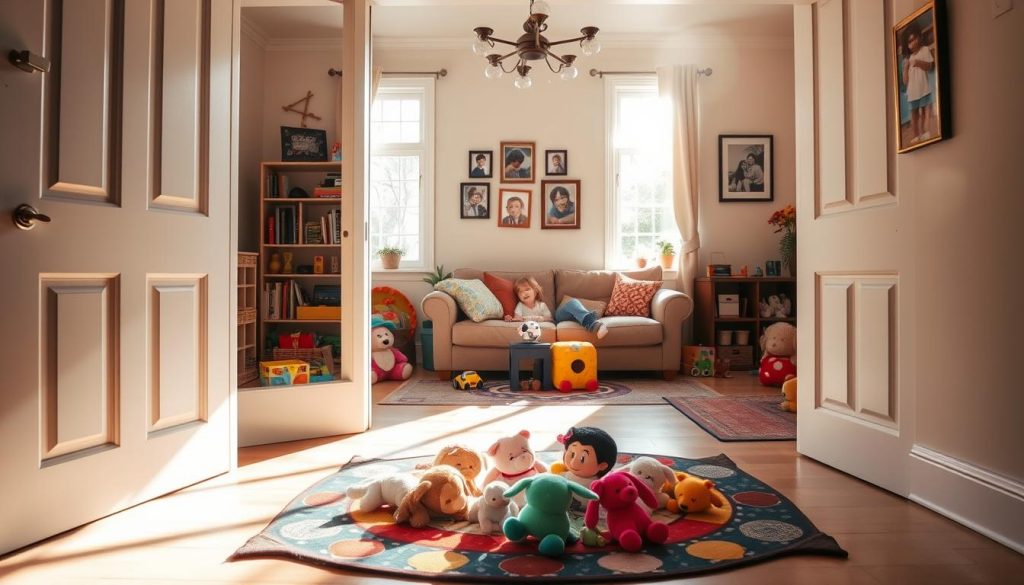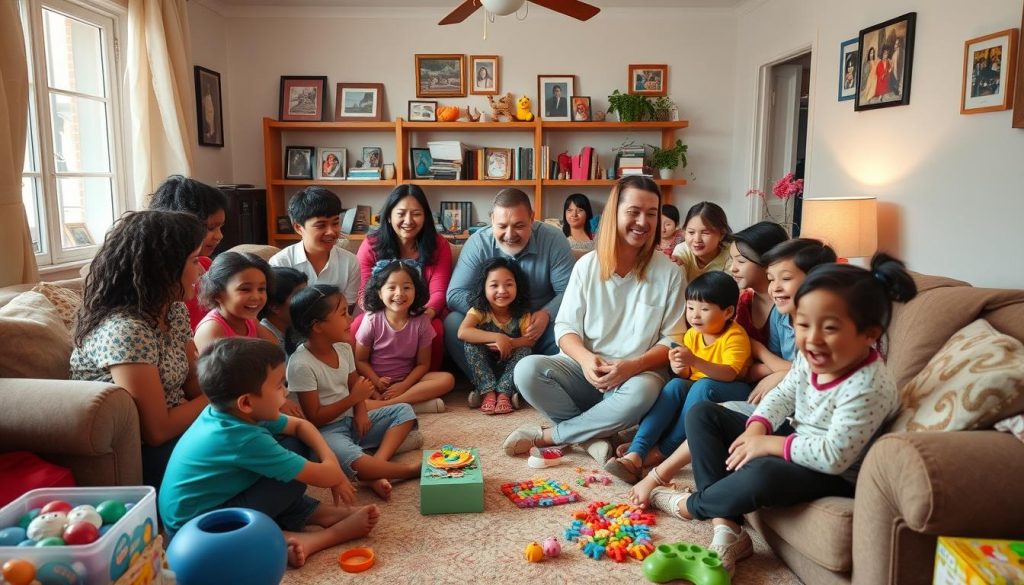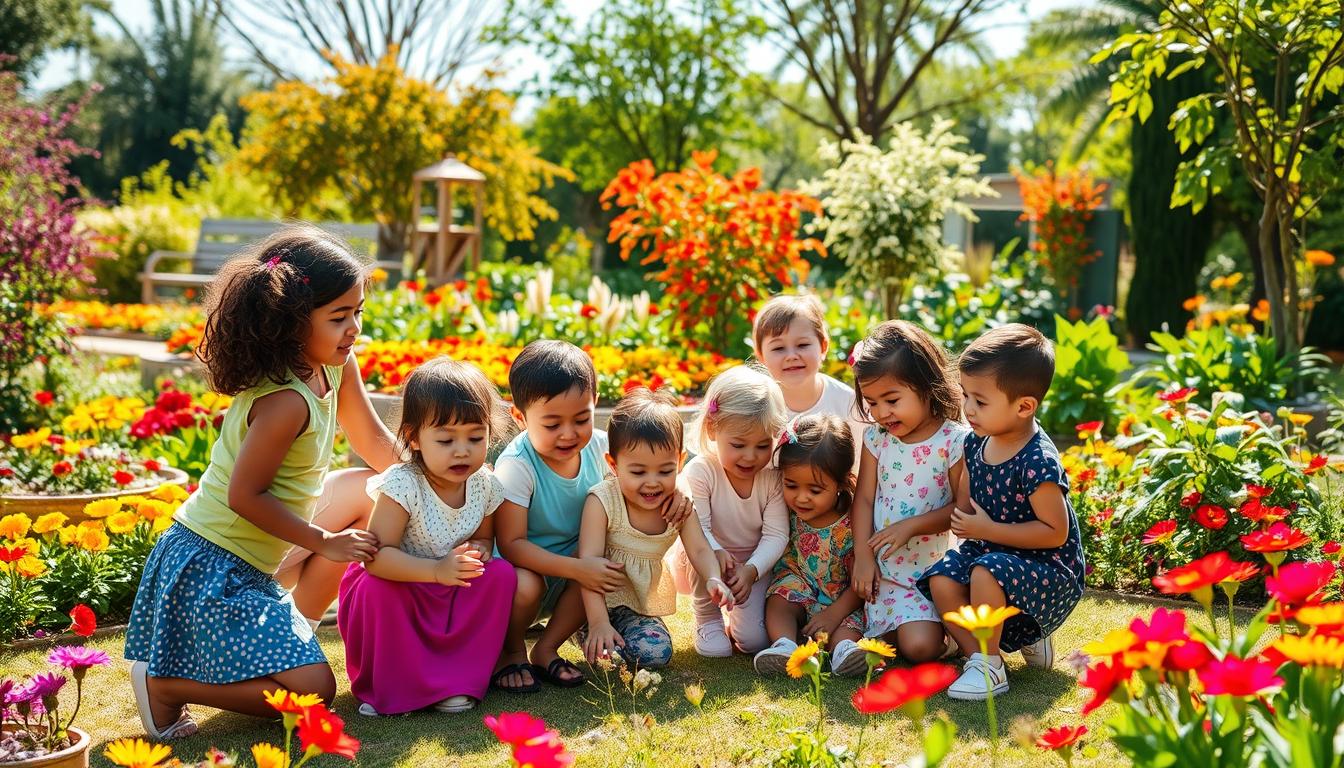Finding the right foster care agency is crucial for both foster parents and children. This guide highlights the best agencies of this year. We focus on service quality, support, and successful placements.
We aim to help you choose the best agency for your needs. Whether you’re looking into traditional foster care, therapeutic options, or adoption, we’ve got you covered. Our guide includes top services and leading organizations across the United States.
Key Takeaways
- California leads in foster care placements with 45,924 children in care as of fiscal year 2022.
- The average time spent in the foster care system is 22 months.
- Organizations like KidsPeace and American Adoptions provide 24/7 support and comprehensive services for foster families.
- The overall rate of children in foster care remained consistent at 5.1 per 1,000 children in 2011 and 2021 in the United States.
- The Administration for Children and Families has requested a significant budget for foster care improvements in the upcoming fiscal year.
Understanding Adoption and Foster Care
Exploring child welfare means knowing about the adoption process and the foster care system. Both aim to give kids a safe, loving home. Yet, they have key differences.
What is Adoption?
Adoption makes adoptive parents the legal guardians of a child. It removes the biological parents’ rights. This gives the child a stable, loving home where adoptive parents make all important decisions.
The adoption process is detailed. It includes home studies to check if the adoptive parents are ready. This shows how vital adoption is for a child’s long-term well-being.
What is Foster Care?
Foster care is a temporary solution for kids whose families can’t care for them. The foster care system lets kids live with foster families. The state or biological parents still have legal rights.
Foster parents get licensed to ensure they can care for these kids. They also get financial help for the kids’ needs. This setup is key for immediate care while working on a permanent solution.
Key Differences Between Adoption and Foster Care
The main difference is in permanence and legality. Adoption is permanent, offering stability and commitment. Foster care is temporary, with legal rights still with the biological parents or the state.
Adoption often involves legal help from agencies or lawyers. Foster care legal matters are handled by state or child welfare groups. Adoption also means embracing different cultures, respecting the child’s identity.
In short, adoption and foster care both protect and care for children. But they have different paths and outcomes. Knowing these differences helps in providing the best care for kids.
Importance of Foster Care Agencies
Foster care agencies are key in the community. They offer vital services to foster children and families. They provide advocacy, guidance, and training to help everyone in the foster system.
Their Role in the Community
Agencies are great at managing child placements. State workers handle 25 to 35 cases at once, causing delays. But, private agencies can make plans faster because of their efficient systems.
The impact of foster agencies is huge. They help public systems and give special attention. Private agencies have social workers who can spend more time with families. This leads to better results for kids and happier foster parents.
Agencies vs. Individual Foster Parents
Going it alone as a foster parent is tough. Agencies offer resources and tips that are hard to find on your own. They provide licensing, rules, and training. State agencies are free, but private ones might cost more and offer more flexibility.
Choosing between state and private agencies depends on several things. Like how close the agency is, the importance of building relationships, and faith-based preferences. Some states have many agencies, giving foster parents more choices. Both types of agencies offer training to help find the right fit.
In summary, both state and private foster care agencies are very helpful. They make foster parenting better and are crucial in the community.
Criteria to Consider When Choosing an Agency
Choosing a foster care agency is a big decision. You need to look at several important factors. These help you find a reputable and supportive organization. They prepare you for the responsibilities and support needed for foster families. Here are the key things to consider.
Licensing and Accreditation
First, check if the agency is foster care licensed and accredited. All agencies must meet state standards. But, look for those that go beyond these minimums. For example, Colorado’s standards are just the starting point, showing big differences between agencies.
Make sure the agency follows quality and ethical standards. Also, check if it’s accredited by well-known national organizations.
Range of Services Offered
The services an agency provides greatly impact your experience. Agencies place different numbers of children each month, affecting wait times. It’s key to know the types of children they place, like age and special needs.
Large agencies might offer flexible training, while smaller ones give more personal attention. Ensure the agency provides comprehensive services like adopting from foster care and trauma-informed training.
Support for Foster Families
Getting ongoing support for foster families is crucial. Look at the support they offer, like court help and home visits. They should also assist with training and placement issues.
Good support includes babysitter resources and connections with other foster families. This support can greatly impact your journey as a foster parent.
- Licensing and Accreditation
- Range of Services Offered
- Support for Foster Families

| Criteria | Significance | Examples |
|---|---|---|
| Foster Care Licensing | Ensures minimum standards compliance | Colorado’s licensing requirements |
| Range of Services | Influences the type and level of support | Trauma-informed training, annual training assistance |
| Support for Foster Families | Provides essential ongoing assistance | Court participation, mediation support, support groups |
Thoroughly evaluating these criteria helps you choose a reliable agency. It ensures you get the services and support needed. This preparation is crucial for facing the responsibilities and challenges of fostering.
The Most Highly Rated Foster Care Agencies
Choosing the right foster care agency is key for those wanting to foster. It’s about knowing which agencies are best and meet the needs of children. This section looks at the top agencies, both national and local, known for their excellent service.
Top National Agencies
Many national agencies are praised for helping foster children find permanent homes. They offer great training for foster parents and support services.
- Koinonia: Known for creating lasting bonds, Koinonia provides lots of resources and training. This helps keep children in stable homes.
- Bethany Christian Services: As one of the biggest agencies, Bethany offers many services. They support families from start to finish.
- Children’s Bureau: Focused on child welfare, Children’s Bureau works hard to keep families together. They make sure each child’s needs are met.
Notable Local Agencies
Local agencies also shine for their dedication and care. They are deeply rooted in their communities, offering support that fits local needs.
- Koinonia Family Services: In North Carolina, Koinonia works closely with the Department of Social Services. They aim to find permanent homes quickly for children.
- Wake County Human Services: Serving a big area in North Carolina, Wake County Human Services is fast in finding homes for children.
Recognition and Awards
These agencies have won awards for their work in foster care and adoption. Their programs help children thrive and support foster parents.
In FY 2022, Koinonia was praised for lowering foster care numbers and boosting adoption. With 27% of foster kids adopted and 57% by their foster parents, their dedication is clear.
| Agency | Services | Notable Achievements |
|---|---|---|
| Koinonia | Foster Care, Adoption, Training | Awarded for reducing transitions and supporting foster families |
| Bethany Christian Services | Foster Care, Pregnancy Counseling, Adoption | Nationwide presence with extensive support to adoptive families |
| Children’s Bureau | Child Welfare Programs, Family Services | Recognized for strong reunification and permanency planning |
These numbers show more than just stats. They highlight the emotional and psychological benefits of having dedicated organizations. By choosing top-rated foster care agencies, you help provide stable homes for children and reduce their time in foster care.
Services Provided by Foster Care Agencies
Foster care agencies are key in supporting foster families and ensuring children’s well-being. They offer a wide range of services to meet the needs of both foster parents and children. This creates a supportive environment for growth and stability. Let’s look at some of the main services these agencies provide.
Training and Resources for Foster Parents
Foster care training is vital for parents to provide quality care. Agencies provide training on child development, behavior management, and trauma-informed care. This training helps foster parents handle the challenges of fostering, ensuring they meet the emotional and physical needs of the children.
Agencies also offer support groups, educational materials, and respite care. These resources help foster parents deal with the complexities of foster care. They also provide necessary breaks to prevent burnout.
Counseling and Support for Children
Child support services focus on the emotional health of children in foster care. Agencies offer counseling and therapeutic services to help children cope with trauma and foster system challenges. These services are crucial for promoting mental well-being and resilience in foster children.
Specialized programs like therapeutic foster care are available for children with higher needs. Foster parents in these programs receive advanced training and support to care for these children.
Advocacy and Legal Support
Understanding legal rights in foster care is vital for foster parents and children. Agencies provide advocacy and legal services to protect these rights. They help families navigate the legal system, understand their rights, and meet legal requirements during the foster care process.
Agencies also advocate for the best interests of children in their care. They ensure children are placed in safe and loving environments. This approach supports both children and foster families, respecting everyone’s rights and needs.
| Type of Service | Description |
|---|---|
| Foster Care Training | Comprehensive programs to prepare foster parents for caregiving responsibilities. |
| Child Support Services | Counseling and therapeutic support designed for the emotional well-being of children. |
| Legal Rights in Foster Care | Advocacy and legal services to protect the rights of foster children and parents. |
| Advocacy in Adoption | Support and services to facilitate smooth and lawful adoption processes. |
The Adoption Process Through Agencies
Adopting a child through a foster care agency is a detailed process. It’s designed to find the best match between child and family. Understanding the adoption legal process is key for a successful adoption. We’ll guide you through the important stages.

Steps to Prepare for Adoption
Getting ready for adoption can feel daunting, but agencies help every step of the way. One important step is orientation. This meeting gives you vital information about children in foster care and your role as an adoptive parent.
You’ll also learn about the community of over 200,000 families on platforms like Facebook. This community shares their adoption journey.
- Orientation: Learn about the adoption process and requirements.
- Training and Education: Complete at least several foster parent training and orientation sessions.
- Home Study: Participate in a home study, which assesses your readiness for adoption.
- Matching Process: During this time, your profile is considered alongside the profiles of available children.
In this stage, you’ll have regular visits from social workers. These visits check if the child and family are adjusting well. The home study and matching process can take six to twelve months. This depends on the agency and regional rules.
Finalizing Your Adoption
After the initial steps, you’re closer to finalizing your adoption. Once a match is found, there’s a waiting period before you can submit your adoption petition.
The adoption legal process doesn’t end with placement. It usually takes six months to legally end a child’s parental rights. This allows for the final legal steps. Foster-to-adopt scenarios are common, ensuring the child’s stability while legalities are settled.
| Stage | Duration |
|---|---|
| Initial Waiting Period | 6-12 Months |
| post-placement Supervision Visits | Monthly |
| Finalization Hearing | 1 Day |
Your adoption journey ends with a finalization hearing. This process usually lasts a day but is very impactful. The court reviews the case to ensure everything is legal and ethical. After the hearing, you become the child’s permanent, legal parent.
Navigating the adoption legal process takes patience, understanding, and preparation. Agencies provide the necessary resources and support. They help make adopting a child a reality.
Finding the Right Match for Foster Care
The process of matching in foster care is complex. It changes based on location, organization, and individual needs. Each year, foster care helps around 570,000 children in the United States. Finding the right match ensures the child’s safety and emotional well-being.
Matching Children with Families
There’s no one-size-fits-all approach to matching children with families. Factors like the child’s safety needs and the family’s financial situation matter. Organizations like AdoptUSKids help by creating national and state photolistings.
It’s important to know a child’s special needs before making a decision. This helps families prepare. A good match in foster to adopt scenarios can make the transition smoother for the child.
Importance of Cultural Competence
Cultural competence is key in matching in foster care. It ensures the child’s cultural identity is respected. Transracial adoptions highlight the need to celebrate a child’s heritage.
Finding birth parents is also important for a child’s cultural identity in adoption. Organizations like Mentor Foster Care offer care services that support a child’s cultural background. This approach helps preserve the child’s identity while in care.
| Matching Factor | Impact on Child |
|---|---|
| Pre-placement Visits | Reduced Anxiety |
| Cultural Competence | Positive Cultural Identity |
| Informed Decision-Making | Better Adaptation |
| Support Systems | Increased Stability |
Challenges Faced in Foster Care
They face many challenges, from dealing with family separation to navigating a complex system. It’s key to understand these to offer the right support.
Emotional and Psychological Challenges
The emotional toll of fostering is huge. Kids often deal with trauma, like attachment disorders and PTSD. Also, a third of them face mental health issues.
For foster parents, saying goodbye is hard. It’s especially tough when kids go back to their birth parents or get adopted.
Navigating the System
Getting through foster care can be tough. Each state has its own rules, making things complicated. The goal of reunification is in 54% of plans, so everyone must adjust to changing situations.
Support Systems Available
Support for foster parents is crucial. There are resources to help with emotional and psychological needs. Programs focus on trauma-informed care, tailored to each child’s unique situation.
Co-parenting with birth parents is becoming more common. It helps provide stability during tough times.
Former foster care youth are half as likely to pay a mortgage or rent compared to their peers, and more than one-fifth experience homelessness within a year of emancipation.
It’s important to grasp the emotional impact of fostering. We need strong support systems to help with family separation. With the right help, foster care can be a better experience for everyone involved.
Success Stories from Foster Care Agencies
Foster care experiences are diverse, but many stories show positive outcomes. These tales highlight the impact of fostering. They also show how foster care agencies make lasting changes in children’s and families’ lives.
Inspirational Foster Care Stories
An Iowa couple fostered 100 babies, giving countless children safety and love. Their dedication shows the deep impact of fostering.
A family in the U.S. fostered 24 children, supporting them through growth stages. Their commitment shows fostering’s ability to provide stability and care.
Simone Biles started a scholarship for foster care kids. It shows how adversity can lead to success.

A family adopted four teens who aged out of the system. They ensured a smooth transition into adulthood. This shows foster care’s effectiveness and importance.
A user adopted a child who faced abuse and developmental delays. Despite challenges, the child thrived. This shows foster care’s ability to help children grow resilient.
Impact of Foster Care on Children
Foster care can deeply affect children, leaving lasting positive marks. For example, Tony went to college after being adopted. This shows the long-term benefits of a caring foster environment.
Christian walked at 14 months despite initial disabilities. Foster care supported his remarkable progress. This shows the power of a supportive environment.
Benjamin thrived with his aunt after being exposed to drugs at birth. The stability and family connection helped his development. This shows the importance of family in foster care.
Julius, at 17, found hope and support in a relative’s family. He pursued his GED and a better future. This shows how fostering can change lives.
Many children in foster care are saved from separation and find loving homes. For example, five siblings were adopted by second cousins. This preserved their family bonds and created a loving environment.
The emotional toll and waiting for court decisions can affect foster care experiences. Yet, foster parents’ commitment is key to positive outcomes.
| Story | Impact |
|---|---|
| Iowa couple fostering 100 babies | Provides safety and love, emphasizing the impact of fostering |
| Family fostering 24 children | Shows the stability and care offered through fostering |
| Simone Biles’ scholarship program | Turns adversity into opportunities for future success |
| Adoption of four teens | Ensures smoother transition into adulthood |
| Child overcoming developmental delays | Highlights the resilience foster care can develop |
| Tony’s college success | Validates the long-term benefits of a nurturing foster environment |
| Christian walking despite disabilities | Showcases remarkable development in supportive environments |
| Benjamin thriving with aunt | Illustrates the positive influence of family connections in foster care |
| Julius’ pursuit of a GED | Demonstrates the redirection of life through foster support |
| Five siblings adopted by second cousins | Preserves familial bonds and creates a loving environment |
Future Trends in Adoption and Foster Care
The world of foster care and adoption is changing for the better. New trends are making it easier for children and families. These changes aim to improve the foster care and adoption experience.
Changes in Legislation
Recently, laws have changed to help foster care more. The number of kids in foster care has gone down for four years in a row. This shows the system is getting better.
In Fiscal Year 2022, there were nearly six percent fewer kids in foster care than in 2021. These law changes are making the system more efficient. They help kids leave foster care faster and get back with their families.
Innovations in Foster Care Services
New technology is also playing a big role in foster care. It helps match kids with the right foster families. This makes foster care services better for everyone.
Thanks to these changes, kids spend less time in foster care. More kids are being adopted with help from public agencies. The number of adoption subsidies has also gone up.
Here’s a look at some key numbers:
| Metric | 1998 | 2022 |
|---|---|---|
| Number of children in care | 559,000 | 368,500 |
| Average time in care (months) | 33 | 24 |
| Children under 5 years in care | 25% | 35% |
| Reunification goals | 39% | 52% |
| Successful reunifications | – | 46% |
These changes show we’re moving in the right direction. We’re using new laws and technology to help kids. Our goal is to make sure every child has a stable and loving home.
How to Get Involved with Foster Care
Getting involved with foster care offers many ways to help. You can become a foster parent or volunteer. Both options support children and families in need. Let’s look at how you can help.
Becoming a Foster Parent
Deciding to foster is a big step. It’s important to know what’s involved. Start by contacting local foster care agencies, like Michigan’s Department of Health and Human Services (MDHHS) or the Foster Care Navigator Program.
These agencies help with the licensing process. They offer support and guidance from experienced foster parents. This is crucial for new foster parents.
After deciding to foster, you’ll need to complete training and background checks. You’ll attend training sessions to prepare for the challenges. These sessions focus on creating a safe, nurturing home for foster children.
Respite care providers are key in foster care. They offer short-term care to families. This support helps keep placements stable and reduces neglect or abuse risks.
Volunteering Opportunities
Volunteering in foster care is another great way to help. If you’re not ready to foster a child, there are still ways to make a difference. Mentoring is one such opportunity.
Mentoring is very beneficial for foster children. It can help them stay in school and avoid illegal drugs. Children with mentors are also more likely to participate in activities and hold leadership roles.
Organizations like the National Foster Care and Adoption Directory help find mentoring opportunities. Programs like CASA offer vital services. Volunteers work with a case for about 1.5 years and complete a 30-hour training course.
Foster care organizations also need help with supplies and toys. Your time and resources can greatly impact children’s lives. MDHHS county offices offer volunteer opportunities in foster care and adoption.
Community involvement is key for foster care success. Post Adoption Resource Centers (PARCs) and the Michigan Adoption Resource Exchange provide support and resources. They help foster families and children through ongoing support.
In conclusion, whether you want to foster a child or volunteer, there are many ways to help. Your support can greatly impact the lives of children and families in foster care.
Resources for Foster Families
Foster families have many resources to help them. These include online communities and educational programs. They aim to give foster parents the skills to handle foster care’s challenges.
Online Support Groups
Online support groups are key for foster families. They offer a community and shared experiences. Foster parents can share, get advice, and support each other here.
Being part of these groups helps foster parents feel less alone. They get emotional and practical help from others who get it.
Educational Material and Workshops
Training and workshops are vital for foster parents. They cover topics like child development and trauma-informed care. Agencies provide training to prepare foster families for different needs.
Adoption education programs also help. They give families the knowledge needed for adoption. This supports them in creating stable, loving homes.
These resources are crucial for a good fostering experience. They help foster families and the children they care for thrive. With these resources, foster families can ensure the well-being and growth of every child.
FAQ
What are the top foster care agencies of this year?
What is adoption?
What is foster care?
What are the key differences between adoption and foster care?
What is the role of foster care agencies in the community?
How do foster care agencies support individual foster parents?
What criteria should I consider when choosing a foster care agency?
What are some of the most highly rated foster care agencies?
What services do foster care agencies provide?
What are the steps to prepare for adoption through an agency?
How important is cultural competence in matching foster children with families?
What emotional and psychological challenges are faced in foster care?
Can you share some success stories from foster care agencies?
What are some future trends in adoption and foster care?
How can I get involved with foster care?
What resources are available for foster families?
This post contains affiliate links. If you click on a link and make a purchase, I may earn a small commission — at no extra cost to you. Thank you for supporting this blog and helping me keep the patterns free! Read the full Affiliate Disclosure & Transparency.
